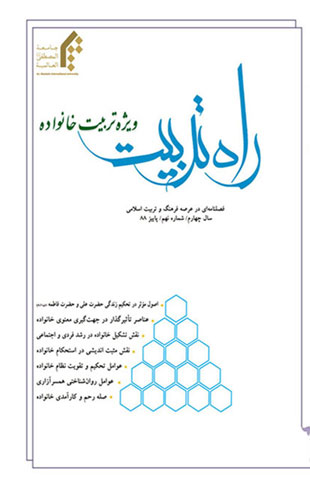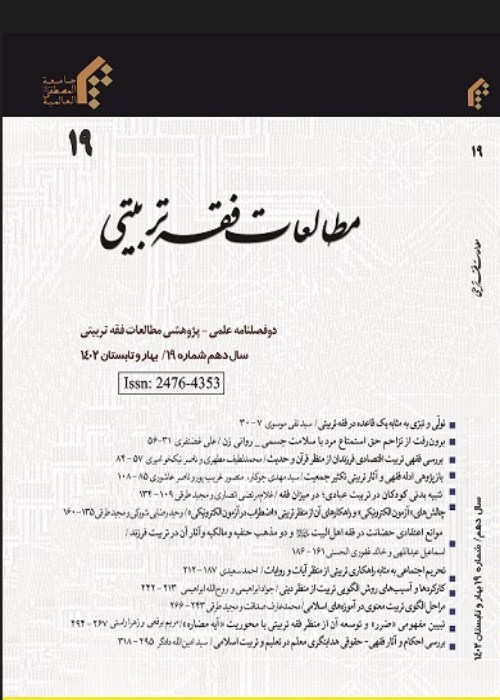فهرست مطالب

مجله مطالعات فقه تربیتی
سال چهارم شماره 9 (پاییز 1388)
- ویژه تربیت خانواده
- تاریخ انتشار: 1388/09/01
- تعداد عناوین: 12
-
صفحه 7
-
صفحه 13
- مقالات
-
صفحه 91
-
صفحه 125
-
صفحه 155
-
صفحه 167
-
صفحه 181
-
صفحه 191
-
Page 23Family constitutes the primary core of formation of a society, and the society’ssuccess depends on its strength and solidity. The strength of family depends onsome strategies and principles; the way of life of the Impeccable – as the preeminentmodels – is a reliable source for identifying and discovering these principles. Amongthem, Imam Ali’s and her holiness Fatima’s conduct in their family life is of specialimportance due to their special conditions and privileges, including their exclusiveprivilege of being Impeccable. The present article is seeking to investigate the mostimportant principles and strategies of solidifying family life manifested in Imam Ali’sand her holiness Fatima’s way of life.
-
Page 37Spirituality is a luminous, celestial and inner state, created in human beings throughservitude to God, following His injunctions and avoiding evils. The important elementsof this spiritual and celestial journey are as follows: observing piety and abstinence(doing what is religiously obligatory and avoiding sins); educational methods andan effective insight on spirituality; adorning oneself with divine morality and virtuousattributes and avoiding evil and malicious attributes; sincerity and self-reflectionwhich is the true nature of spirituality and servitude; order and self-scrutiny; effortand constant struggle, each of which having an effective role in this way; resortingto the Prophet’s household, which is a key solution in every problem; and a goodcompanion or friend who prompts spiritual state in man. Formation of all thesefactors occurs in family, while the challenges facing the family are aggravated in thepresent age by avoiding spirituality in family system.The present paper is seeking to explain scientifically and practically the spiritualelements founded on religious knowledge and the Islamic leaders’ way of life, andthereby presenting some methods for strengthening the foundation of family. Thisis because spirituality, more than any other factor, leads to the potency, growth andpromotion of family system.
-
Page 59Family is one of the first systems in human communities, remained immutable in itsgoals and functions despite of basic evolutions, and still enjoying a basic importancein all communities. Though formally the smallest unit in a society, it constitutes thefoundation of community – in other words, its central core – as far as importanceand value are concerned. Family is the best system for fulfilling humans’ material, mental and spiritual needs, and supplies the best context for providing mental security and peace for its members, nurturing the new generation, and socializing children as well as fillingthe individuals’ emotional needs. In the present article, the most important individualand social effects of forming a family are mentioned; these effects include preservingchastity, gaining peace and quiet, achieving perfection, transmitting values andcustoms, strengthening the community, filling the emotional needs, preparing theground for nurturing children, increasing the value of one’s actions, achievingeconomical growth, etc. Finally, the undesirable consequences of avoiding marriageare mentioned, including an increase in vices, perversion and corruption; mentaland physical illnesses; emergence of social disorders; being deprived of legitimateand rational pleasures; not achieving high spiritual stages.
-
Page 73Family is a sacred social and religious institution wherein many of human’s individualand psychological needs are fulfilled; it prepares the ground for individual perfectionand its members’ achieving friendship and affection. This sacred institution requiresenforcement. Among the factors which can strengthen this sacred institution ispositive thinking by all members of the family about one another.The present article aims at investigating the role of positive thinking in familyintegrity. To do so, some empirical researches have been reviewed and religioussources have been consulted. By positive thinking, we mean paying attention topositive aspects of life, presenting positive interpretations for others’ behaviors, andexpecting favorite results based on positive interpretations. Here, some factors havebeen mentioned, through which the basis of the family may be strengthened. Thesefactors are as fallows: intra-family satisfactory relations, gaining more support fromone’s spouse, conjugal satisfaction, effective opposition to intra-family tensions,paying attention to positive features of the family members, considering the facilitiesof the family, positive interpretation of the family members’ behaviors, winning familymembers’ affection, and the mental health of the family members.
-
Page 91The importance of «family solidity» results from the importance of family institution. The sacred institution of family is the fundamental basis of human society anddifferent cultures, to the extent that felicity and plight of the nations are dependenton the families’ being guided or misguided. The first condition for having a healthyand dynamic society is the health and stability of the family. By family solidity, we mean the promotion of the moderation principle, dominance ofmorality, and protecting the rights of all members. Since the holy Quran considersthe family members’ mental peace (Quran, Rum, 21) as the goal of establishingthe spousal relation and forming a family unit, it is necessary for all behaviors andinteractions to aim at realizing this goal. There are different factors contributing to the stability and solidity of the family, andthe present article is seeking to present the most important ones among them usingQuranic verses and Islamic traditions and through a psychological perspective. The stability of family relations is dependent on two sets of factors: extra-familialand intra-familial. As for the extra-familial factors, they fall into three spheres ofculture and social milieu, the economy of the society, and the two parties’ families. As for the intra-familial factors, the following ones have been mentioned: payingattention to family status, the family’s householder, setting roles, and the spouses’affection.
-
Page 125The most important goal and philosophy of marriage is mental peace. This peaceresults from fulfillment of the man and woman’s needs and their complementationin the light of marriage. Man and woman thus move and accept the difficulties ofmarriage to achieve its high result. In some cases, however, the goal of family isnot arrived at due to various factors. One of them is the harassment imposed onone of the spouses by the other – intentionally or unintentionally, consciously orunconsciously. Among different forms of spouse harassment are the following ones:acerbity, aggression, beating, belittling, ingratitude, obliging, scurrility, accusing,suspicion, sternness, sexual harassment, and abusing the rights of one’s spouse,all of which affecting their relationship negatively. Formulating these factors andinforming spouses of instances of them is an important step in controlling the problemof spouse harassment. The roots of this problem can be categorized into five groupsof factors, i.e. individual, familial, cultural, economic and structural factors. In thispaper, the psychological roots and factors of spouse harassment are investigatedwith a look at Islamic teachings and scientific researches.
-
Page 155All living things attempt to fulfill their basic needs in different dimensions to achieve equilibrium, and preserve their efficiency. Human as God’s vicegerent and the noblest creature needs more effort, since not fulfilling his/ her needs would lead to imbalance and abnormality, preventing him from achieving his goals. One of the basic needs of every person is an interaction with others, the blood relatives in particular. Interaction with blood relatives, called seley-e rahim in our religious culture, has many consequences and functions in fulfilling the psychological and social needs of the family members, and for their being effective agents. Those functions studied here are as follows: (1) fulfilling the need to affection, group membership (in extended family), and self-expression; (2) observing family and social norms facilitating the process of socializing; (3) having access to social protection on the part of relatives, mental peace and security, and an increase in emotional interaction; and (4) eliminating poverty.


